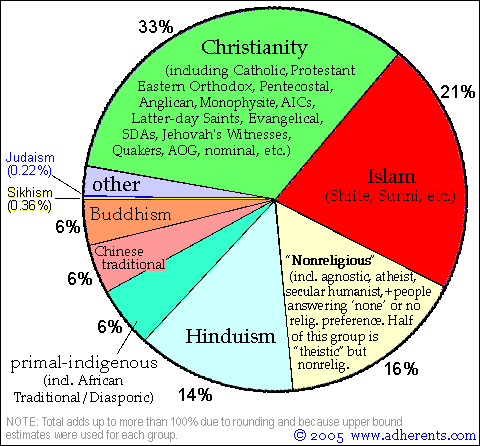This is a BIG subject, which I will be addressing over a couple of weeks, with the direct support of Lena Winfrey Seder and perhaps you. Yes, I’m asking for your opinions and insights, you can leave a comment here (if you request I will not publish your comment or your name).
The subject I want to address is religion in general, and the similarities in teachings and structures, as well as the differences.
I do not believe that we all worship the same God. By that, I mean that our reasons for seeking God may be the same, but what we choose to believe defines God can be exceptionally different. What we believe God wants from us, and how we should praise God, are often diametrically opposed to other people who profess a belief in God. Almost everyone agrees that “God is Love”, but love means different things to different people, and is expressed in different ways.
I will start by saying that I was raised Christian, subset Baptist, subset Southern Baptist. I had the great fortune to have a minister who was an intellectual scholar of the Bible, and who inspired the members of his church to thoroughly understand scripture. Not by telling us his interpretation, but by laying out several interpretations, comparing them and expressing his own views and biases, and encouraging us to interpret for ourselves. Thank you Dr. Colton. As a result of Dr. Colton’s teachings, I investigated several other religions in my youth, various branches of Christianity, Eastern religions, and pagan practices. In the end I found that I eschew organized religion, which typically follows a charismatic local individual. I follow the teachings of Christ in an “organic” manner, and to provide a label for those that wish to categorize me, I refer to myself as a Zen Baptist.
This chart reflects the relative sizes of world religions. I was rather surprised by many factors, I suspect that Communism in China has skewed the numbers for Taoism and “Chinese cultural religions”, but these numbers are representative of several sources.
You can see that “Christian” is the largest group, and within that group are some exceptionally diverse denominations.
There are many people, including myself, who don’t consider Catholics to be “Christians”. “What?” you ask, “How could the Catholic Church, founded by Christ and led by the apostle Peter not be Christian?”. There are several reasons, I will point out just a few here. Christ said in Peter’s presence, “Call no man Father“, then the Catholic church decided to call it’s priests “father”. Christ taught that the individual’s relationship with God is one on one, yet the Catholic church requires confession to a priest, who has the power to absolve your sins. Christ denied any importance to his mother, yet the Catholic church reveres her as a saint. This does not sound like the doctrine of Christ.
This of course is my opinion, and will no doubt piss off many of my friends and relatives. My point is this, just because something is called “Christian”, doesn’t mean that it fits some universal definition of “Christian”. The members of the Westboro Baptist Church consider themselves Christians, but I’m pretty sure a website titled “GodHatesFags” is an indicator that they know little about Christ. Mormons have written their own version (not translation but different ideas) of the Bible, as have the Jehovah’s Witnesses.
Following this line of discussion, just because an individual describes themselves as belonging to a certain denomination does not mean they fit the definition of a member of that church. This goes beyond little things. I met a girl at a dance, and we dated for several weeks before I met her father. He was the minister of a church that saw dancing as a sin. She had not told me this, so when he asked how we met…well that was the end of our relationship. Not to pick on Catholics, but they tend to stand out as the religion least likely to be adhered to. They have very strong doctrine about birth control, and many if not most Catholics ignore it while considering themselves “good Catholics”. I’ve known people who have totally removed themselves from the church and still consider themselves to be Catholic.
I am using Christianity in this article as an example, because at the root of all of this, Christians are just humans with a particular set of beliefs. There is nothing genetically or psychologically different from any other sample of humanity as a group. So when I hear people say “Christians are this” or “Religion is responsible for that” I feel the need to correct them. People do things, there are good people and bad people, and those people may belong to a religion, or they may not. Since thirty three percent of the world is Christian, it would seem natural to expect Christians to be responsible for about a third of the bad things out there. No religion is a monolith.
Religion in general, and any religion specifically, is not responsible for the actions of people who wave the flag of a religion. It has been my experience that those who justify their actions with religion are likely to have little to no understanding of the religion they’re talking about.
With Lena’s assistance I intend to look at the second largest religion, Islam, next week, and I would greatly appreciate the input of anyone who understands their own religion and can contrast the public impression of their religion for future articles.
Understanding our similarities helps us appreciate each other, understanding our differences helps us appreciate ourselves.
Chapter two of this series, “Islam” can be seen here.

